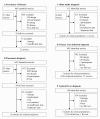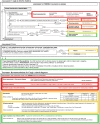Managing the Sick Child in the Era of Declining Malaria Transmission: Development of ALMANACH, an Electronic Algorithm for Appropriate Use of Antimicrobials
- PMID: 26161753
- PMCID: PMC4498609
- DOI: 10.1371/journal.pone.0127674
Managing the Sick Child in the Era of Declining Malaria Transmission: Development of ALMANACH, an Electronic Algorithm for Appropriate Use of Antimicrobials
Abstract
Objective: To review the available knowledge on epidemiology and diagnoses of acute infections in children aged 2 to 59 months in primary care setting and develop an electronic algorithm for the Integrated Management of Childhood Illness to reach optimal clinical outcome and rational use of medicines.
Methods: A structured literature review in Medline, Embase and the Cochrane Database of Systematic Review (CDRS) looked for available estimations of diseases prevalence in outpatients aged 2-59 months, and for available evidence on i) accuracy of clinical predictors, and ii) performance of point-of-care tests for targeted diseases. A new algorithm for the management of childhood illness (ALMANACH) was designed based on evidence retrieved and results of a study on etiologies of fever in Tanzanian children outpatients.
Findings: The major changes in ALMANACH compared to IMCI (2008 version) are the following: i) assessment of 10 danger signs, ii) classification of non-severe children into febrile and non-febrile illness, the latter receiving no antibiotics, iii) classification of pneumonia based on a respiratory rate threshold of 50 assessed twice for febrile children 12-59 months; iv) malaria rapid diagnostic test performed for all febrile children. In the absence of identified source of fever at the end of the assessment, v) urine dipstick performed for febrile children <2 years to consider urinary tract infection, vi) classification of 'possible typhoid' for febrile children >2 years with abdominal tenderness; and lastly vii) classification of 'likely viral infection' in case of negative results.
Conclusion: This smartphone-run algorithm based on new evidence and two point-of-care tests should improve the quality of care of <5 year children and lead to more rational use of antimicrobials.
Conflict of interest statement
Figures
Similar articles
-
A novel electronic algorithm using host biomarker point-of-care tests for the management of febrile illnesses in Tanzanian children (e-POCT): A randomized, controlled non-inferiority trial.PLoS Med. 2017 Oct 23;14(10):e1002411. doi: 10.1371/journal.pmed.1002411. eCollection 2017 Oct. PLoS Med. 2017. PMID: 29059253 Free PMC article. Clinical Trial.
-
Predictive value of clinical and laboratory features for the main febrile diseases in children living in Tanzania: A prospective observational study.PLoS One. 2017 May 2;12(5):e0173314. doi: 10.1371/journal.pone.0173314. eCollection 2017. PLoS One. 2017. PMID: 28464021 Free PMC article.
-
Development and evaluation of an electronic algorithm using a combination of a two-step malaria RDT and other rapid diagnostic tools for the management of febrile illness in children under 5 attending outpatient facilities in Burkina Faso.Trials. 2022 Sep 15;23(1):779. doi: 10.1186/s13063-022-06717-8. Trials. 2022. PMID: 36109766 Free PMC article. Clinical Trial.
-
Electronic clinical decision algorithms for the integrated primary care management of febrile children in low-resource settings: review of existing tools.Clin Microbiol Infect. 2018 Aug;24(8):845-855. doi: 10.1016/j.cmi.2018.04.014. Epub 2018 Apr 21. Clin Microbiol Infect. 2018. PMID: 29684634 Review.
-
Self-diagnosis and self-treatment of Plasmodium spp. infection by travellers (1989-2019): A systematic review and meta-analysis.Travel Med Infect Dis. 2020 Nov-Dec;38:101902. doi: 10.1016/j.tmaid.2020.101902. Epub 2020 Oct 23. Travel Med Infect Dis. 2020. PMID: 33132136
Cited by
-
Rapid Diagnostic Tests to Guide Case Management of and Improve Antibiotic Stewardship for Pediatric Acute Respiratory Illnesses in Resource-Constrained Settings: a Prospective Cohort Study in Southwestern Uganda.Microbiol Spectr. 2021 Dec 22;9(3):e0169421. doi: 10.1128/Spectrum.01694-21. Epub 2021 Nov 24. Microbiol Spectr. 2021. PMID: 34817224 Free PMC article.
-
A Blueprint for Clinical-Driven Medical Device Development: The Feverkidstool Application to Identify Children With Serious Bacterial Infection.Mayo Clin Proc Digit Health. 2024 Oct 30;2(4):656-664. doi: 10.1016/j.mcpdig.2024.10.003. eCollection 2024 Dec. Mayo Clin Proc Digit Health. 2024. PMID: 40206536 Free PMC article.
-
Can the use of digital algorithms improve quality care? An example from Afghanistan.PLoS One. 2018 Nov 26;13(11):e0207233. doi: 10.1371/journal.pone.0207233. eCollection 2018. PLoS One. 2018. PMID: 30475833 Free PMC article.
-
Converging Human and Malaria Vector Diagnostics with Data Management towards an Integrated Holistic One Health Approach.Int J Environ Res Public Health. 2018 Feb 3;15(2):259. doi: 10.3390/ijerph15020259. Int J Environ Res Public Health. 2018. PMID: 29401670 Free PMC article. Review.
-
Febrile illness diagnostics and the malaria-industrial complex: a socio-environmental perspective.BMC Infect Dis. 2016 Nov 17;16(1):683. doi: 10.1186/s12879-016-2025-x. BMC Infect Dis. 2016. PMID: 27855644 Free PMC article.
References
-
- World Health Organization M. Medicines use in primary care in developing and transitional countries [Internet]. World Health Organization (WHO); 2009. Available: http://www.who.int/medicines/publications/who_emp_2009.3/en/
Publication types
MeSH terms
Substances
Associated data
LinkOut - more resources
Full Text Sources
Other Literature Sources
Medical





